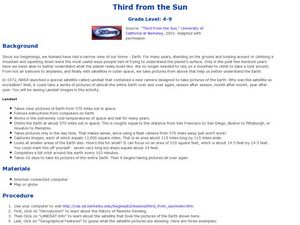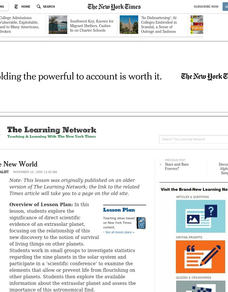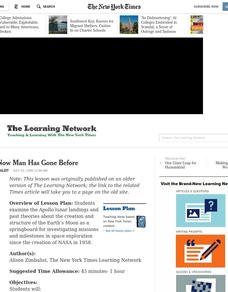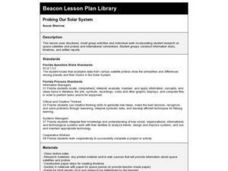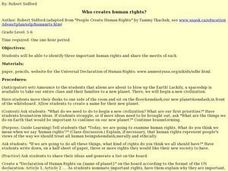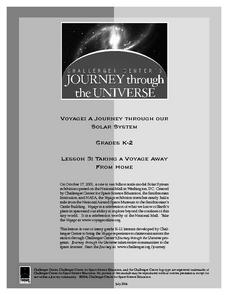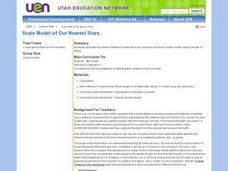Messenger Education
Exploring Solar Systems Across the Universe
Scientists have theorized that our solar system formed 4.6 billion years ago. In this pair of activities, learners first hypothesize how our solar system was formed. Using this information, groups then determine how scientists search for...
University of Colorado
The Jovian System: A Scale Model
Jupiter has 67 moons! As the seventh in a series of 22, the exercise shows learners the size and scale of Jupiter and its Galilean moons through a model. They then arrange the model to show how probes orbited and gathered data.
Journey Through the Universe
How Far is Far?
The earth only revolves around one thing — and it's not any of your pupils. The lesson includes two activities dealing with the distance to the sun and the moon. First, scholars create a pin hole camera and use the rules of similar...
Starry Night Education
The Stars
Three astronomy activities in one resource! Here you will find one hands-on activity, one demonstration, both with discussion questions, and one activity worksheet. During these lessons young scientists discuss how stars are...
Journey Through the Universe
Is There Anyone Out There?
What is an alien's favorite game? All-star baseball! Scholars start defining living and non-living. Then, they conduct experiments to research if life exists, keeping in mind that life could be in many forms, not just human.
California Academy of Science
Kinesthetic Astronomy: Earth's Rotation
After completing the activity, "Kinesthetic Astronomy: The Meaning of a Year," zoom in on Earth's rotation using the same simulation setup and this outline. Each class member dons a map of the Western Hemisphere and plays the part of...
Captain Planet Foundation
Fall into Healthy Shapes
Kindergartners identify geometric shapes by planting a fall garden. They start their seeds in containers that have different shapes, and keep track of their plants based on those shapes. This brilliantly designed and incredibly thorough...
Curated OER
Earth
First graders define what a planet is and study the planet earth. They examine the effects of the sun on the earth and make a model.
Curated OER
Moon, Mars, and Beyond-Mission Briefing
Students complete this introductory lesson in which they find out about the scenario for a simulated online space mission. They review vocabulary and complete a review sheet to reinforce the details of the mission and its goals.
Curated OER
Our Solar System to Scale
Students calculate the diameter of planets and their relative distances. In this space science lesson, students discover how small or big the planets are in comparison to each other. Students use cross multiplying fractions to find...
Curated OER
Third from the Sun
Students examine images from space. In this third from the Sun lesson plan, students examine images from, Landsat, the satellite launched by NASA in 1972.
Curated OER
Project SETI.
Tenth graders study how to search for life in outer space and make use of the 40-foot radio telescope at Greenbank, West Virginia. Request that the telescope be pointed at a particular location and time and receive data back from it...
Curated OER
Rubber Gardens
Students recycle discarded automobile tires and create gardening sites for limited space areas.
Curated OER
Voyage: A Journey through our Solar System
Students build the Voyage scale model of the Solar System on a playground and "travel" to each planet. They recognize that the Sun and planets are tiny worlds in a vast space, giving them a new perspective on the Solar System, and...
Curated OER
A Whole New World
Students work in small groups to investigate statistics regarding the solar system and participate in a 'scientific conference'. They explore available information about the extrasolar planet and assess the importance of this...
Curated OER
Where Now Man Has Gone Before
Students examine the Apollo lunar landings and past theories about the creation and structure of the Earth's Moon as a springboard for investigating missions and milestones in space exploration since the creation of NASA in 1958.
Curated OER
Probing Our Solar System
Third graders engage in a lesson utilizing small group activities and individual work incorporating student research on space satellites, probes and international connections. They, in groups, construct information disks, timelines, and...
Curated OER
MAPPING THE TOPOGRAPHY OF UNKNOWN SURFACES
Young scholars describe in words and graphic displays the elevation or depression profile of sections of Mars' Olympus Mons and/or Valles Marineris. They explain how orbiting spacecraft build up global maps one data slice at a time.
Curated OER
Cosmic Wheels
Learners build a scale model of the Solar System and determine the time other planets take to travel around the Sun in comparison to the time of the Earth's revolution. The velocity of the planets are also determined in this lesson.
Curated OER
Who Creates Human Rights?
Learners examine the importance of human rights. They participate in a simulation of starting a new civilization on another planet, create a class "Declaration of Human Rights," and write a journal entry based on class discussion...
Curated OER
Taking a Voyage away from Home
Students experience and participate in a journey through a "Voyage" exhibition of the Solar System and the frontier it covers. They build a dynamic model of the Earth and Sun. Descriptions are given on the relative sizes of the Sun and...
Curated OER
Gazing At Cosmic Pinballs
Students explore the world of stars. They see that the color of a star tells how hot or cold it is, that stars come in different sizes. and that stars are moving through space. They draw lines connecting start to star.
Curated OER
Scale Model of Our Nearest Stars
Sixth graders calculate a light day, light hour, and light minute from the standard of a light year. After establishing the distances, a one meter scale is created to demonstrate the distance between the sun and the planets of our solar...
Curated OER
One World Ocean
Young scholars compare and contrast the properties of salt water in the oceans/seas and freshwater elsewhere on the planet. They also analyze mixing caused by currents in the ocean, including the effects of warm and cold water as well as...
Other popular searches
- Planets Outer Space
- Science Space and Planets
- Outer Space Outer Planets
- Poetry Space and Planets
- Planets and Space
- Space Planets Scale
- Space and Planets Practical












